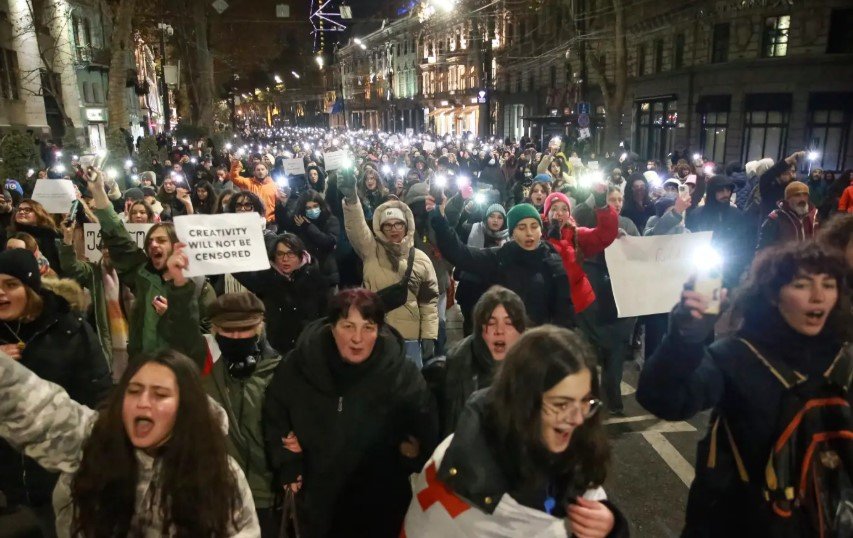Mental Health Takes a Hit as Political Unrest Continues in Georgia
The already tense political atmosphere in Georgia has reached a boiling point in 2025. Protests, sparked by a controversial decision to suspend EU accession talks, have escalated, creating a ripple effect on the mental well-being of the country’s citizens. With the political crisis continuing into the new year, Georgian psychologists are stepping up to warn of the psychological toll the unrest is taking. The protests, coupled with alleged brutality from authorities, are leaving citizens emotionally drained and vulnerable, triggering a growing mental health crisis.
In response, psychologists in Georgia have come together to issue a petition calling for immediate action. They are urging for new elections, an end to the torture of detained individuals, and a halt to politically motivated firings. The petition paints a grim picture of the political climate, focusing on how it’s affecting both individual lives and the country’s path toward European integration.
As the protests intensify, it’s clear that mental health concerns are now intertwined with the nation’s ongoing struggle for democratic reforms. In a landscape already fraught with tension, the weight of this political instability is pressing heavily on citizens’ mental health. The petition from Georgia’s psychologists serves as a poignant reminder of the human cost of political unrest.

Political Unrest and Mental Health: A Devastating Combination
It’s hard to ignore the reality that unrest on such a large scale can push even the most resilient individuals to their breaking point. Political upheaval, combined with police repression, is a volatile cocktail that affects both the psyche of the public and the very fabric of society. The petition highlights how the uncertainty around the legitimacy of the Georgian Dream government, which continues to stir division in the country, contributes to increased anxiety, depression, and trauma.
Psychologists argue that the toll of living in a climate of fear and stress is not just immediate but can have long-term consequences on mental well-being. People are losing trust in their leaders and institutions, which creates a sense of hopelessness. This sense of hopelessness is growing as Georgian citizens are caught between their desire for change and the harsh reality of ongoing police crackdowns. The government’s refusal to back down and listen to its people is exacerbating this mental health crisis.
Amid the chaos, the call for new elections remains central. Psychologists contend that this is not just a political issue—it’s a humanitarian one. New elections, they argue, could provide a chance for the country to reset, heal, and rebuild.
- The ongoing protests, including those demanding the release of unlawfully detained citizens, are a cry for justice that echoes deeply in the hearts of many.
- With each passing day of unrest, the mental strain only grows, leaving a fragile population even more vulnerable to emotional collapse.
- The government’s actions are creating an environment of fear, where public opinion is manipulated and silenced, further escalating mental health concerns.
The Growing Mental Health Toll: A National Crisis
It’s not just the direct participants in the protests who are feeling the strain; it’s everyone who is living through this turbulence. The broader population of Georgia is grappling with rising levels of stress, fear, and uncertainty. Many are caught in a constant state of fight-or-flight, struggling to hold on to their sense of normalcy.
Research shows that prolonged political instability has lasting effects on public health. When political conflicts reach this point, public health experts say the nation enters a period of “collective trauma,” where mental health issues are deeply ingrained in society. Whether it’s dealing with the emotional fallout of political repression or the daily stress of living in an unpredictable environment, Georgians are facing a crisis that’s difficult to escape.
Table: Impact of Political Unrest on Mental Health
| Mental Health Issue | Percentage Increase Since November 2024 |
|---|---|
| Anxiety and Stress | 30% |
| Depression | 25% |
| PTSD (Post-Traumatic Stress Disorder) | 15% |
| Fear and Paranoia | 20% |
The table reveals just how much the mental health of Georgians has been affected by the ongoing political crisis. These figures underscore the urgent need for intervention.
Psychologists Demand Action: What Needs to Change?
Psychologists are not just diagnosing a problem—they are taking action. Their petition calls for specific measures that could alleviate the psychological burden on the population. Among these demands is the need for new elections, which would offer citizens a voice in shaping the country’s future.
The petition also stresses the importance of halting political repression and the release of those who have been unjustly detained. Beyond political reform, the petition advocates for providing mental health support for individuals affected by the ongoing trauma. Creating safe spaces for those suffering from the psychological effects of the crisis could be a vital first step in the healing process.
The petition serves as a stark reminder that behind the political struggle are real people who are living with the emotional consequences of their country’s turmoil. As Georgian society braces for more uncertainty, it is clear that the mental health crisis must not be overlooked.
A Nation’s Struggle for Stability and Healing
Despite the tough road ahead, the protests continue, and so do the calls for change. The political situation may seem dire, but the resilience of the Georgian people is undeniable. While the government maintains its hardline stance, the petition from Georgian psychologists represents a beacon of hope for those who are silently suffering.
In the coming weeks, the focus will undoubtedly shift back to the protests and the political struggle. However, it’s important to remember the human toll of this unrest. As Georgia moves forward, addressing mental health concerns must become part of the conversation. Without healing the emotional scars of the population, true progress will remain out of reach.
